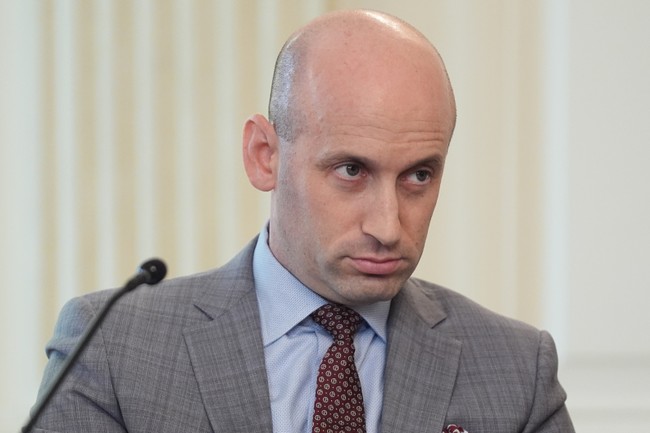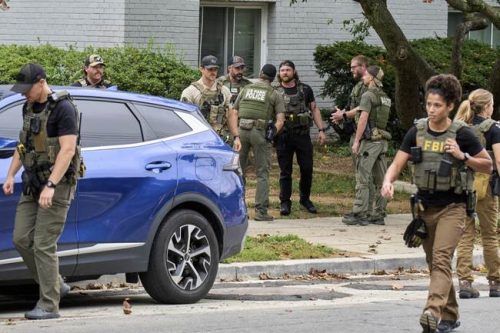The Justice Department is pushing to investigate a person accused of posting Stephen Miller’s home address and stalking his family, but local Democratic officials and judges in Northern Virginia are creating obstacles. This clash highlights a broader tension about law enforcement, free speech, and partisan protection for activists. The accused is a 66-year-old retired professor, and the FBI sought her phone as part of the probe. Judges and a progressive prosecutor have moved to limit that search, prompting an appeal from the DOJ.
The matter began with flyers placed in Miller’s neighborhood that listed his address and labeled him a “Nazi,” while a QR code on the flyers linked to an activist account. The suspect, identified as Barbara Wien, is a retired professor and activist, and video reportedly shows her making a gesture toward Miller’s wife that implies she was watching the family. Police later seized Wien’s phone during their investigation as they tried to determine whether the conduct crossed legal lines. If someone posts a home address and implies surveillance, that is a public safety issue, not merely speech.
What should be routine law enforcement work has become politicized, with two judges and a local prosecutor moving to restrict federal evidence-gathering. A Magistrate Judge denied the FBI’s petition for a warrant to search the suspect’s phone, and the DOJ plans to appeal that denial. The FBI wants to see whether Wien lied to investigators or was part of a coordinated effort that could threaten Miller and his family. Those are standard steps when a complaint alleges doxxing and targeted harassment.
The Justice Department's push to investigate a progressive activist accused of doxxing top Trump adviser Stephen Miller has been stymied by two judges and a Virginia prosecutor, according to court records and state and federal law enforcement sourceshttps://t.co/ifF7NV1pGz
— Marc Caputo (@MarcACaputo) November 7, 2025
Why it matters: The case — ostensibly a battle over free speech rights — exposes the sharp partisan divide between Northern Virginia’s Democratic resistance and President Trump’s MAGA government, just across the Potomac River.
Driving the news: Late Wednesday, Magistrate Judge Lindsey Vaala denied the FBI’s petition for a warrant to search the smartphone owned by the suspect in the case, a 66-year-old retiree named Barbara Wien.
The Justice Department plans to appeal, a source told Axios.
The FBI wants to examine Wien’s phone to see if she lied to investigators or was part of a group that might pose a risk to Miller and his family.
Weeks earlier, in a related state investigation, a progressive prosecutor in Arlington, Va., made an unusual request by essentially siding with the defense to persuade a state judge to limit the search and keep the data from the FBI.
A prosecutor in Arlington reportedly urged a state judge to restrict evidence so the FBI could not access it, an uncommon move that signals political calculation more than neutral lawyering. A senior White House official said the judge believes Miller “deserves this, so it shouldn’t be investigated.” That quote, if accurate, shows judicial preference entering a criminal inquiry and raises equal protection concerns. Law enforcement should follow evidence, not political sympathies.
Wien’s lawyer insists she broke no laws and claims her phone is being “unlawfully held,” arguing the actions were protected speech. That defense is predictable, but posting a private address alongside language about being “wanted for crimes against humanity” and an image that encourages crowds is different from ordinary protest. Courts must weigh context: true threats and doxxing aimed at private residences cross lines that civil liberties protections do not cover. Public safety should not be sacrificed to ideological affinity.
The broader pattern is troubling: when partisan actors start shielding activists from federal probes, it undercuts rule of law and invites unequal treatment. If the roles were reversed and a Biden official were targeted, there would likely be a different level of urgency and cooperation from local authorities. Consistency in applying the law matters more than which side benefits today, and citizens deserve equal protection regardless of politics.
The Justice Department’s decision to appeal reflects that concern and underscores the need for an independent process. The FBI’s interest in examining a suspect’s phone in a stalking and doxxing probe is standard investigative practice, and limiting that scrutiny can inhibit efforts to determine motive and network connections. Appeals courts will have to balance privacy rights with the state’s obligation to protect residents from targeted harassment.
Local officials and judges should avoid becoming partisans in criminal investigations and instead let legal standards guide their decisions. Protecting free speech is important, but it cannot be a shield for harassment or threats that put families at risk. The case will likely test how courts interpret the boundary between protected protest and criminal conduct in an era of targeted information warfare.
Editor’s Note: The Schumer Shutdown is here. Rather than put the American people first, Chuck Schumer and the radical Democrats forced a government shutdown for healthcare for illegals. They own this.
Help us continue to report the truth about the Schumer Shutdown. Use promo code POTUS47 to get 74% off your VIP membership.






